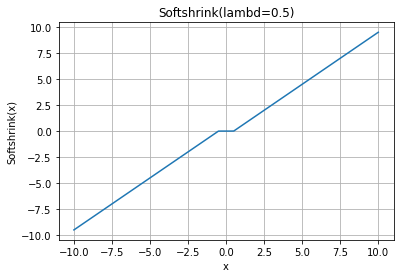mindspore.nn.SoftShrink
- class mindspore.nn.SoftShrink(lambd=0.5)[source]
Applies the SoftShrink function element-wise.
\[\begin{split}\text{SoftShrink}(x) = \begin{cases} x - \lambda, & \text{ if } x > \lambda \\ x + \lambda, & \text{ if } x < -\lambda \\ 0, & \text{ otherwise } \end{cases}\end{split}\]SoftShrink Activation Function Graph:

- Parameters
lambd (number, optional) – The threshold \(\lambda\) defined by the Soft Shrink formula. It should be greater than or equal to 0, default:
0.5.
- Inputs:
input (Tensor) - The input of Soft Shrink. Supported dtypes:
Ascend: float16, float32, bfloat16.
CPU/GPU: float16, float32.
- Outputs:
Tensor, the same shape and data type as the input.
- Raises
- Supported Platforms:
AscendGPUCPU
Examples
>>> import mindspore >>> from mindspore import Tensor, nn >>> import numpy as np >>> input = Tensor(np.array([[ 0.5297, 0.7871, 1.1754], [ 0.7836, 0.6218, -1.1542]]), mindspore.float16) >>> softshrink = nn.SoftShrink() >>> output = softshrink(input) >>> print(output) [[ 0.02979 0.287 0.676 ] [ 0.2837 0.1216 -0.6543 ]]